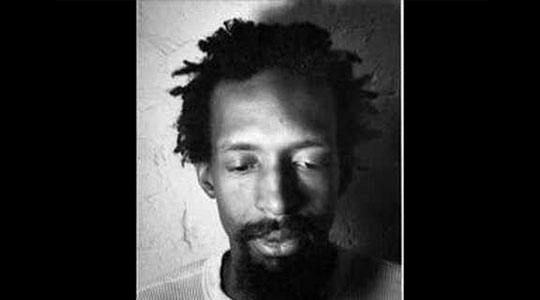Julius Eastman
[US]

Julius Eastman (1940-1990) was a mercurial, gay, African-American composer who mixed canny minimalist innovation with head-on political provocation. He is known for his fusion of minimalist compositional techniques with certain conventions of pop music, as well for his provocative, politically motivated compositions.
Eastman was born in Ithaca, New York in 1940. His affinity for the piano as a child led to his acceptance to the prestigious Curtis Institute in Philadelphia, where he went on to switch majors to composition. Although also active as a dancer and choreographer, he was better known during the seventies and eighties for his work as a versatile vocalist. He was praised for his role as solo baritone on the 1973 Grammy-nominated recording of Peter Maxwell Davies’ Eight Songs for a Mad King, conducted by Pierre Boulez; he was the first man in Meredith Monk’s esteemed vocal ensemble; he was also a close collaborator of Arthur Russell’s (among other things, he appeared as an organist and vocalist in the 1981 Dinosaur L production 24-24 Music). His involvement in the academic strata of contemporary music was intermittent and turbulent – in 1975, during a performance of John Cage’s Song Books at SUNY Buffalo, where Eastman held a stipend, he invited a young man onstage to undress him and made sexual gestures under Cage’s instruction to “give a lecture”. Cage was furious and Eastman left Buffalo soon after. He wasn’t one to shy away from friction. During his ensuing time in New York City, his diverse activities as a composer and musician all served to bridge the gap between the ‘uptown’ (i.e. academic) and ‘downtown’ (i.e. pop) music scenes. He translated post-minimalism and post-Cageian radicalism into a buoyant musical language friendly to the ears of the liberated disco generation.
Towards the end of his life, Eastman’s behaviour became more erratic, and he retreated further into isolation. Homeless, mostly forgotten, and reliant on alcohol and drugs, Eastman died alone of cardiac arrest at the age of 49, and much of his work disappeared along with him. However, in recent years, his music has garnered a surge of international posthumous acclaim. Eastman is now celebrated as an indispensable outsider in (post) minimalism and as a pioneering minority voice. In 2016, a recording of his delicate 1974 composition, "Femenine", was released posthumously on Frozen Reeds after the work was found by NYC composer Mary Jane Leach. Two years after the piece was first written, Eastman stated in an interview: “What I am trying to achieve is to be what I am to the fullest […] Black to the fullest, a musician to the fullest, a homosexual to the fullest” (NY Times). His best known works include the urgent, racing Evil Nigger (1979) and the beautiful and melancholic Gay Guerilla (1980). Eastman’s work arrives in its “wild, grand, delirious [and] demonic” glory, with “an uncontainable personality surging into sound” (The New Yorker).


